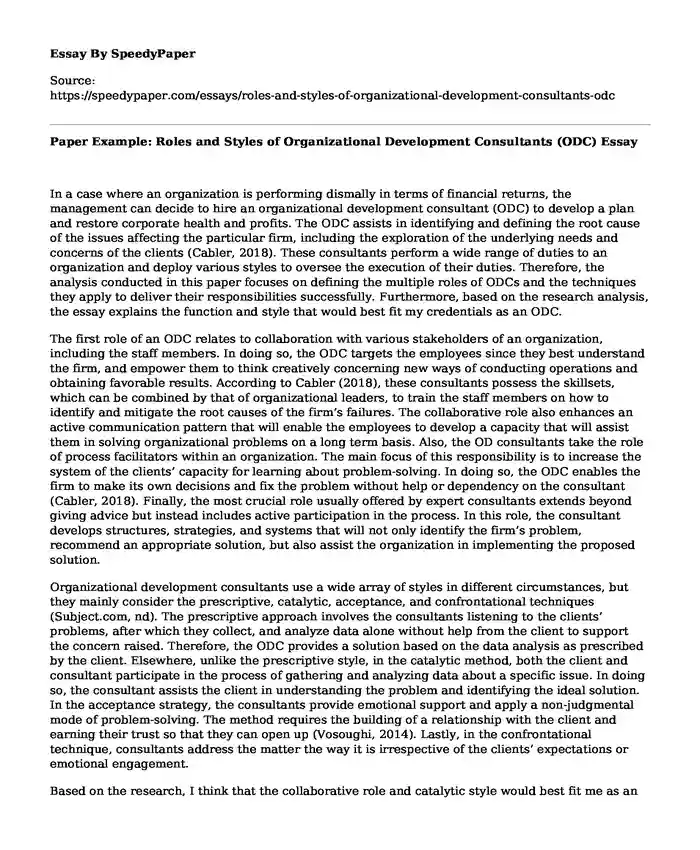
| Essay type: | Narrative essays |
| Categories: | Goal Organizational behavior Personal experience Business strategy |
| Pages: | 3 |
| Wordcount: | 713 words |
In a case where an organization is performing dismally in terms of financial returns, the management can decide to hire an organizational development consultant (ODC) to develop a plan and restore corporate health and profits. The ODC assists in identifying and defining the root cause of the issues affecting the particular firm, including the exploration of the underlying needs and concerns of the clients (Cabler, 2018). These consultants perform a wide range of duties to an organization and deploy various styles to oversee the execution of their duties. Therefore, the analysis conducted in this paper focuses on defining the multiple roles of ODCs and the techniques they apply to deliver their responsibilities successfully. Furthermore, based on the research analysis, the essay explains the function and style that would best fit my credentials as an ODC.
The first role of an ODC relates to collaboration with various stakeholders of an organization, including the staff members. In doing so, the ODC targets the employees since they best understand the firm, and empower them to think creatively concerning new ways of conducting operations and obtaining favorable results. According to Cabler (2018), these consultants possess the skillsets, which can be combined by that of organizational leaders, to train the staff members on how to identify and mitigate the root causes of the firm’s failures. The collaborative role also enhances an active communication pattern that will enable the employees to develop a capacity that will assist them in solving organizational problems on a long term basis. Also, the OD consultants take the role of process facilitators within an organization. The main focus of this responsibility is to increase the system of the clients’ capacity for learning about problem-solving. In doing so, the ODC enables the firm to make its own decisions and fix the problem without help or dependency on the consultant (Cabler, 2018). Finally, the most crucial role usually offered by expert consultants extends beyond giving advice but instead includes active participation in the process. In this role, the consultant develops structures, strategies, and systems that will not only identify the firm’s problem, recommend an appropriate solution, but also assist the organization in implementing the proposed solution.
Organizational development consultants use a wide array of styles in different circumstances, but they mainly consider the prescriptive, catalytic, acceptance, and confrontational techniques (Subject.com, nd). The prescriptive approach involves the consultants listening to the clients’ problems, after which they collect, and analyze data alone without help from the client to support the concern raised. Therefore, the ODC provides a solution based on the data analysis as prescribed by the client. Elsewhere, unlike the prescriptive style, in the catalytic method, both the client and consultant participate in the process of gathering and analyzing data about a specific issue. In doing so, the consultant assists the client in understanding the problem and identifying the ideal solution. In the acceptance strategy, the consultants provide emotional support and apply a non-judgmental mode of problem-solving. The method requires the building of a relationship with the client and earning their trust so that they can open up (Vosoughi, 2014). Lastly, in the confrontational technique, consultants address the matter the way it is irrespective of the clients’ expectations or emotional engagement.
Based on the research, I think that the collaborative role and catalytic style would best fit me as an ODC. It is because this role is future-oriented and would enable me to engage with the staff of the client organization to improve its effectiveness and develop creative measures that will solve its long term problems. On the other end, I also prefer the catalytic style since it facilitates client engagement in the problem-solving process, which will, in turn, ensure the achievement of the collaborative duties and teamwork.
References
Cabler, K.N. (2018). The Impact of Organizational Development (OD) Methodology on
Leadership Training: A More Intentional Consulting Approach. Journal of Practical Consulting, 6(1): 37-45. https://www.regent.edu/acad/global/publications/jpc/vol6iss1/JPC_6-1_Cabler_pgs37-44.pdfRoles and styles of Organizational Development Consultants (ODCs). (n.d). Subject.com.
Accessed July 14, 2020. https://subjecto.com/roles-and-styles-of-organizational-development-2/Vosoughi, M. (2014). Organizational Development Consulting: A Study of Expert Consultants'
Key Strategies. UNF Graduate Theses and Dissertations, 550. https://digitalcommons.unf.edu/cgi/viewcontent.cgi?article=1567&context=etd
Cite this page
Paper Example: Roles and Styles of Organizational Development Consultants (ODC). (2023, Oct 10). Retrieved from https://speedypaper.net/essays/roles-and-styles-of-organizational-development-consultants-odc
Request Removal
If you are the original author of this essay and no longer wish to have it published on the SpeedyPaper website, please click below to request its removal:
- Gender Equality Essay Sample
- Free Essay Example on Women and Grime Music
- Essay Sample about Leadership
- My Education and Career Goals - Free Essay for Everyone
- Comparative Analysis Essay Sample: Christiane Amanpour and Olga Yurkova
- Free Essay Example - My Social Impact
- Essay Sample on Faith-Based Marketing
Popular categories




